When it comes to an excellent source of protein and nutrients for your bearded dragon, it’s hard to beat the Dubia roach. It’s one of the best foods you can give your beardie. And luckily, Dubia roaches are one of the easiest feeder insects to keep. Here’s everything you need to know to care for Dubia roaches so you can, in turn, care for your dragon.
How to Care for Dubia Roaches: Getting Started
The most important thing to do when you decide to keep roaches is determine your ultimate goal for them. Do you want to breed your own colony or just maintain feeder insects? What your Dubia roach care plan looks like will differ a bit depending on your purpose. In this post you’ll primarily learn how to care for feeder roaches, with a few notes on breeding.
A note on breeding: If you do plan on breeding, be aware that some people develop allergies to roaches with prolonged exposure and contact. Breeders are typically at a heightened risk of developing an allergic reaction (which can include respiratory distress) since it involves more handling and care than keeping the roaches for feeding. Consider adding convenience and minimizing risk with a roach subscription instead—the exact number of roaches at the exact size you need will be delivered to your door just when your dragon needs them.

Supplies
You don’t need much to provide a happy and secure home to your Dubia roaches. Here’s everything you’ll need to get started:
- Dark-colored plastic bin with a lid, or glass tank with a mesh lid. Make sure your containment of choice has smooth sides. Roaches do not crawl up walls, but they can use scuffed surfaces as support and could manage to get out if the interior is not smooth. Additionally, if you opt for a plastic bin, be sure to cut a ventilation hole in the lid and use a glue gun to secure mesh over it.
- Egg crates. You can often purchase the bottom of egg crates from your local grocery store. Roaches love scurrying in and out of the crevices. If you have fewer roaches, you can just pull apart standard-size egg cartons and use the bottoms.
- Roach chow. Although not completely necessary since roaches can eat a variety of fruits and vegetables that people usually have in their homes already, roach chow is an efficient way to add important nutrients that can help your dragon thrive. A healthy roach means a healthy, happy dragon!
- Water gel or crystals, such as our clean and convenient Bug Chug.
- A shallow water dish and a shallow feeding bowl or two.
- A small heater if you are breeding or storing your roaches in a non-heated garage or other environment without regulated temperature.
- A small thermometer and hygrometer to monitor your tank’s temperature and humidity level.
Setting Up the Environment
- Choose the size of your bin or tank. Dubia roaches like to live in tight quarters practically on top of each other, so the size of your containment unit will depend on how many roaches you intend to keep at a time. If you plan to breed, you will most likely want a larger option (e.g., a 14-gallon plastic tote); if you will only be holding 30 to 50 roaches at a time, you’ll want to explore smaller options.
- Decide where to keep your roaches. They prefer to live in total darkness, so if you are using a glass terrarium you will have to keep them somewhere without light. If you are using a solid colored plastic bin, especially navy or black, it doesn’t matter as much if the room is dark. If the idea of storing roaches in your home bothers you, a garage or shed will work just fine as long as you supply appropriate heat.
- Place egg crate bottoms vertically in the bin or tank, ensuring that there are a few inches between the lid and the top of the egg crates to eliminate any possibility of escape. Roaches love to crawl through the egg cubbies, and it will make it easier for you to remove the roaches at feeding time.
- Place the thermometer and hygrometer in the bin or tank; add the heater if needed.
- Then add the roaches!
Note that you will not need any substrate. Roaches actually burrow in their own droppings, so they don’t need anything extra; and substrate only makes it more difficult for you to clean the cage.

Heat and Humidity
Temperature and humidity levels greatly affect Dubia roaches. Follow these guidelines based on your goal with the roaches:
- Growth. Whether your roaches grow or not depends on the temperature they live in. If you currently house roaches that are already the size your dragon needs, keep the temperature between 50 and 70 degrees Fahrenheit (60 or below is best). If you are breeding or want them to grow for another reason, the hotter the better: keep their temperature between 70 and 90 degrees Fahrenheit. The closer the temperature is to 90, the more effective.
- Reproduction. Breeders should set the humidity level at 60 percent and the temperature between 90 and 95 degrees Fahrenheit.
- General comfort. Dubia roaches that are not breeding don’t have specific humidity requirements, although it can’t hurt to give them an occasional misting of water if the air is dry where they are kept. If your roaches seem to have trouble molting, you may need to increase the humidity a bit; but typically roaches get along just fine with humidity levels between 40 and 60 percent.
What to Feed Dubia Roaches
Feeding and Gut-Loading Your Roaches
Dubia roaches are known for eating just about any food, spoiled or unspoiled. They have even been known to eat paper, glue, and similar non-food items. However, just because Dubia roaches can eat almost anything doesn’t mean they should. In determining what to feed your roaches, prioritize the health of your dragon. What nutrients, vitamins, and minerals does your dragon need most? Feed your roaches lots of foods rich in those areas, and your dragon will benefit. This practice is called gut-loading.
Pro Tip: Never feed wild roaches or any wild bugs to your beardie—it’s impossible to know what they’ve eaten or where they’ve been.
Safe Foods
While prioritizing your dragon, you’ll still want to make sure everything you give your roaches is safe for them to consume.

Most produce you’ll find at your local grocery store is safe for roaches to eat. Here are some roach favorites that will benefit your dragon as well:
- Apples
- Bananas
- Beets
- Berries
- Broccoli
- Carrots
- Citrus fruit (Roaches love sweet citrus fruits, but they should only be offered once or twice a week. Bearded dragons cannot tolerate much citrus. The acid is too harsh for their digestive systems.)
- Corn
- Dry fruit
- Leafy greens
- Lettuce (Although this is nutrient-deficient for humans and bearded dragons, roaches metabolize this differently, gleaning protein from it.)
- Grains such as oatmeal
- Mangoes
- Papayas
- Pears
- Peppers
- Pre-packaged “Roach Chow,” which is specialized, nutrient-dense feed created for roaches
- Pumpkin
- Sweet potatoes
- Yams
Pro Tip: Dubia roaches are especially drawn to orange fruits and veggies, possibly due to the vision-improving carotenoids they contain.
Unsafe Foods
Avoid giving these harmful foods to your roaches:
-
Cat food, dog food, and meats. Roaches are naturally high in protein. If they consume too much additional protein, their bodies convert it into uric acid, which can harm your beardie.
- Anything rotting or moldy. Be sure to clean out anything the roaches don't consume within 48 hours to prevent rotting or mold growth. Mold is poisonous to roaches and can wipe out the entire colony.
How to Feed Your Roaches
Typically Dubia roaches can be fed once a day, and it’s okay to skip a day every so often. To feed them, place large fruit and veggie slices or roach chow into a shallow bowl and place the bowl inside the tank or bin. Uneaten food should be removed at least every 48 hours if not 24.
Water
Dubia roaches are famous for drowning easily, so a water bowl or dish isn’t really an option. There are two easy alternatives to make sure they stay hydrated:
- Use water crystals or gel, available online and at most pet stores (or try our super easy, super convenient pre-mixed water crystals!). You can place the gel or crystals in a shallow water dish that is easily accessible for your roaches.
- Hydrate via fruits and veggies. As simple as it sounds.
How much effort you want to put into hydration again comes back to why you are keeping the roaches in the first place. The important thing is they are getting hydrated one way or another.
How to Care for Your Dubia Roach Enclosure
After your roaches have settled into their new home, you'll eventually need to clean the cage. Luckily this does not require much work. Depending on how many roaches you have and how much of a mess is accumulating, you can clean your cage anywhere from every few weeks to every three months.

Here’s all you need to do:
- Find a well ventilated area to clean your tank or bin to minimize the risk of developing an allergy.
- Place the roaches in a spare bin or tank with a lid. Be sure to transfer all of them! You don’t want to deal with an escapee, even though it will most likely die if not found.
- Wearing rubber gloves, remove all “frass” (droppings) and exoskeletons (remains from molting). You can flush the remains down your toilet, throw them away, or discard them in a flower garden or other appropriate place outdoors.
- Optionally, you can scrub the tank or bin clean with soapy water and thoroughly rinse it out.
- Once the enclosure is dry, return the egg crates and roaches to their home. To avoid the chance of mold, make sure the roaches’ home is completely dry.
- Remember to wash your hands any time you come in contact with your roaches.
Pro Tip: To protect your roaches from consuming harmful chemicals, use plant-based soap to scrub your enclosure.
Dubia Roaches for Sale
Ready to Order?
Healthy roaches help your dragon to live a long and happy life. And caring for your dragon’s roaches is as easy as following these simple guidelines. Ready to order your beardie’s first batch of these nutritious treats? Check out our size options and find the best fit. Bon appétit (to your reptile, of course)!
If you have questions or would like to give feedback, please email us at team@dragonsdiet.com








